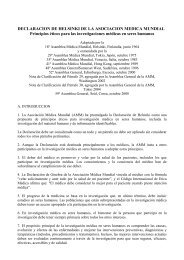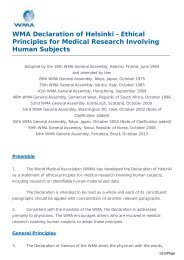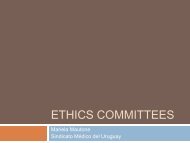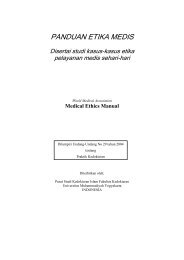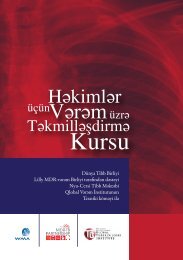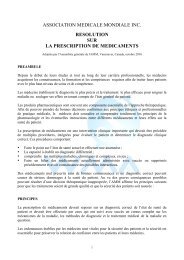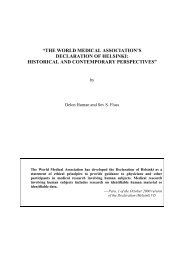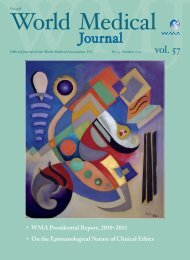WMJ 03 2010 - World Medical Association
WMJ 03 2010 - World Medical Association
WMJ 03 2010 - World Medical Association
- No tags were found...
You also want an ePaper? Increase the reach of your titles
YUMPU automatically turns print PDFs into web optimized ePapers that Google loves.
<strong>Medical</strong> Ethics, Humam Rights, Socio-medical affairs and Environmental Policy<br />
Re-Positioning of Service Delivery in the Nigerian Health System –<br />
the Impact of SERVICOM on Emergency and Other Services in a<br />
Tertiary Health Facility<br />
Emejulu, Jude-Kennedy C. Igwegbe, Anthony O. Eleje, George U.<br />
Ofiaeli, Robinson O. Nwofor, Alexander M. E. Anumonye, Charles O.<br />
Introduction<br />
At the Inauguration Ceremony of the new<br />
members of Nigerian National Assembly<br />
in Abuja, the nation’s capital on 5 th June,<br />
20<strong>03</strong>, the President, Olusegun Obasanjo<br />
declared:<br />
“Nigerians have for too long been feeling shortchanged<br />
by the quality of our Public Service.<br />
Our Public offices have for too long been a<br />
showcase for the combined evils of inefficiency<br />
and corruption, whilst being impediments to<br />
effective implementation of government policies.<br />
Nigerians deserve better. We will ensure<br />
that they get what is better!” [1]<br />
Prior to this, most of these government<br />
agencies had been pronounced inefficient<br />
compared to their privately run counterparts,<br />
and the Federal Government had<br />
resolved to and undertook the process of<br />
privatization and commercialization of public<br />
enterprises in order to improve service<br />
delivery to the nation’s citizens. The health<br />
sector was no exception.<br />
Nigeria’s peculiar health sector has been<br />
discussed at various fora over the past<br />
30 years since the military coup of 31 st December,<br />
1983, which actually gave as one of<br />
the reasons for that putsch as “our hospitals<br />
have become mere consulting clinics” [2, 3].<br />
The <strong>World</strong> Health Organization (WHO),<br />
for these past decades, has rated the Nigerian<br />
health sector very low, more so with the<br />
consistently low budgetary allocation to the<br />
sector by successive government administrations.<br />
Nigeria is classed among the “Low-<br />
Expenditure, Low-Growth Health Economies”,<br />
a group of underdeveloped countries<br />
which despite comprising a population of<br />
2.6 billion people (about 40% of the world’s<br />
population), is unfortunately credited with<br />
less than 5% of the world’s health expenditure<br />
[4]. Countries in this group suffer from<br />
an absolute under-funding of their health<br />
sector, along with a disproportionally high<br />
disease burden.<br />
From 1997 to 2001, Nigeria’s total annual<br />
budgetary allocation to health tottered<br />
around 1.7 – 2.1% (2.1%, 2.3%, 1.7%,<br />
1.7% and 1.9%, respectively), compared to<br />
Cameroon 4.1 – 7.9%, South Africa 10.9 –<br />
12.4%, Namibia 12.4 – 13.1%, Canada<br />
13.9 – 16.2%, and USA 16.8 – 17.6%, in<br />
the same period; and the WHO prescription<br />
is 15% of the Annual National Budget<br />
[5,6]. Since health equated life, it was no<br />
surprise that as the budgetary allocation to<br />
the health sector, and consequently government<br />
investment on health, dwindled, Nigeria’s<br />
average life expectancy dropped from<br />
54 years in 1998 to 43.4 years in 2004 (166 th<br />
out of 177 countries). And till now, there<br />
is no evidence on ground that these indices<br />
are improving [7, 8].<br />
The 20<strong>03</strong>/2004 Nigerian Living Standards<br />
Survey (NLSS) conducted by the Nigerian<br />
National Bureau of Statistics, with international<br />
technical assistance, documented<br />
a national poverty rate of 54.4%, implying<br />
that more than half of Nigerians live on<br />
less than $1 per day (contrary to the WHO<br />
stipulation of $5) [9]. Subjectively, 75.5%<br />
of Nigerians regard themselves as poor,<br />
with most of them situated in the agricultural<br />
and informal sectors particularly at<br />
the village levels. The picture could be scary<br />
1<strong>03</strong>



